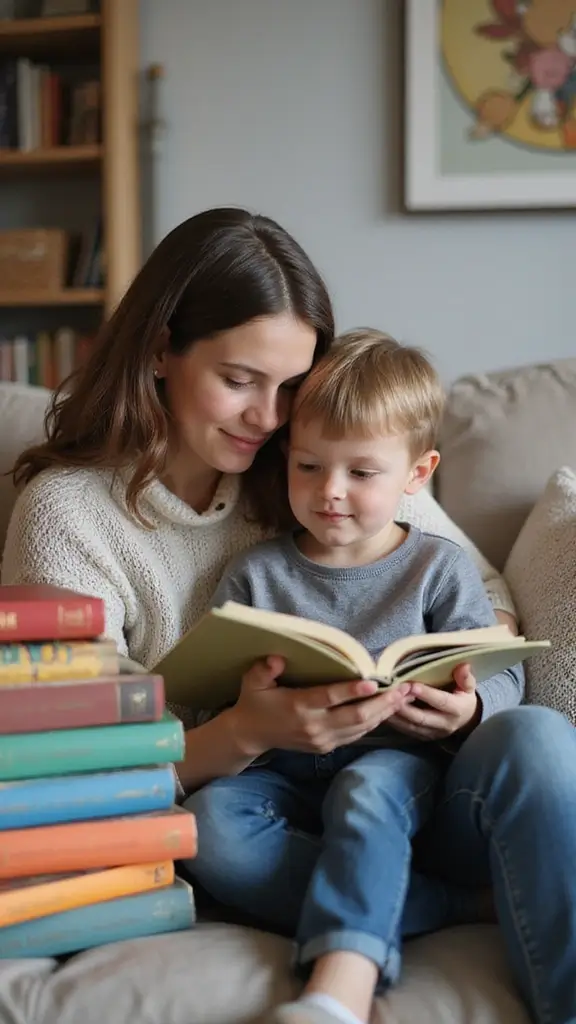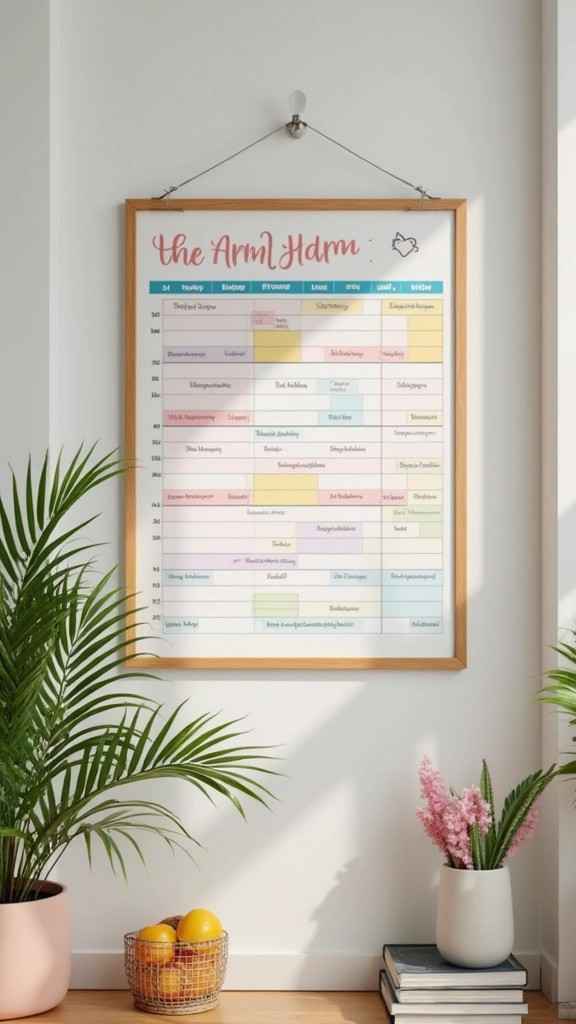I put this together because busy families need simple, practical habits. I see moms and dads chase one tip after another and end up overwhelmed. Mornings, bedtimes, and after-school chaos can wear you down. A steady routine gives kids a sense of security and gives you room to breathe.
Who It’s For If you’re a mom or dad juggling work, chores, and a busy schedule, this is for you. You care about safe choices, calm evenings, and real connection with your kids. This post speaks to new parents, seasoned caregivers, and families of every shape. You want clear, doable steps you can start this week.
1. Embrace Mindfulness

Mindfulness in parenting means you stay present in each moment. You notice what is happening right now with your child. It helps you feel calmer and helps your child feel safe. When you slow down, the home becomes warmer and less loud.
– Start with a tiny daily moment: Set aside 2–5 minutes each day to sit with your child and breathe together, like a calm down ritual before or after meals.
– Take a shared breath in tough moments: Inhale slowly for four counts, exhale for four counts, and name one feeling you notice.
– Make routine tasks mindful: While you wash dishes or tidy toys, notice textures, sounds, and smells and share a quick comment with your child.
– Plan short mindful activities: Try a 10-minute nature walk or kid-friendly yoga, turning movement into a chance to notice the world.
– Listen with your whole body: Keep eye contact, soften your shoulders, and repeat back what your child says in your own words.
– Label feelings together: Help your child name emotions like happy, sad, or frustrated and explain what might help next.
Mindfulness is a steady practice, not a quick fix. You will still lose patience sometimes. That’s normal. The key is small, consistent steps. With practice, you’ll notice a calmer home and trust.
Product Recommendations:
• Mindful Kids: 50 Mindfulness Activities for Kindness
• Focus and Calm
• Gaiam Kids Yoga Mat Exercise Mat
• Yoga for Kids with Fun Prints
• Mindfulness without the Bells and Beads: Unlocking Exceptional Performance
2. Set Clear Boundaries

Boundaries give your child a steady map. When the rules are clear, kids feel safe, know what to do, and try harder. They see limits as care, not punishment, and conflicts drop.
Here’s how to make boundaries work in daily life:
– Be consistent with rules and consequences.
– Involve your child in discussions about boundaries to help them feel empowered.
– Regularly review and adjust boundaries as they grow.
– Explain why a boundary exists so they understand the point.
– Use calm, natural consequences instead of anger.
– Put a simple boundary plan in a visible spot.
Put these ideas into practice with small, real steps. For example:
– Bedtime is set at 9:00 pm to help your child rest.
– During meals, sit at the table with no screens.
– Screen time ends 30 minutes before bed to help wind down.
– Shoes belong in the closet or on a rack, not in the hallway.
If a boundary is crossed, give a brief, calm reminder and follow through with the stated consequence. A steady routine builds trust. Your child learns self-control, respects others, and feels safer at home. You’ll argue less and move more calmly through daily routines. Start small, then grow clear rules over time.
Product Recommendations:
• Sandra Boynton’s 17-Month 2025-2026 My Family Wall Calendar
• Godery Large Visual Schedule for Kids Chore Reward Chart
• TREND ENTERPRISES: Positive Praisers
• superSpots Stickers
3. Encourage Independence

Independence helps kids grow into confident, capable people. When your child learns to do tasks on their own, they gain self-reliance. You guide them, then you cheer their progress.
– Let them choose outfits or snacks to build decision skills. They practice picking quickly and learning from mistakes. That practice helps them stay calm when choices are hard.
– Ask them to help with chores, such as setting the table or folding laundry. This gives them a real job and a sense of teamwork. Over time they see chores as helpful work, not a punishment.
– Give them options when they decide so they learn to compare choices. Start with two simple options and explain the trade-offs. Two options also teach them to weigh risks and benefits.
– Increase tasks as they grow to grow their sense of responsibility. Begin with small tasks that fit their age, and raise the challenge over time. This steady climb builds real independence.
Independence grows with time and patient support. Praise effort, not just results, and keep safety in mind. If a task seems hard, pause, show a quick demo, and try again later. Small steps build a strong, independent kid who can handle daily life.
Product Recommendations:
• The Game Plan Life Skills for Kids Board Game
• Magnetic Dry Erase Chore Chart
• My First Coding Tasks Book For Kids Ages 4+
4. Prioritize Family Time

In the rush of daily life, quality family time often slips away. When you make it a priority, you feel warmth and hear laughter in the house. Regular moments together strengthen bonds and create lasting memories.
Start with simple routines that fit your schedule. You can lean on regular family nights for steady connection.
– Schedule at least one family activity each week.
– Mix up activities to keep things fresh and fun.
– Create a family bucket list of things to do together.
Choose activities that involve everyone, like games, cooking, or a quick walk. Add sensory details to the moment—the clack of dice, the sizzle of onions, or the pop of popcorn. Put a weekly reminder on the family calendar. Let each person pick a different activity every now and then.
Keep it simple and affordable so it stays easy to do. Be flexible when weeks are busy. Keep the idea alive with small moments, even on busy nights. A short family ritual can anchor the time, such as a bedtime toast or a quick question round.
The payoff comes from practice: these moments boost mood, improve communication, and build trust. You gain calmer evenings and a stronger sense of togetherness.
Product Recommendations:
• Sorry! Kids Board Game
• The ChopChop Family Cookbook
• Global Printed Products Weekly Family Planner
5. Practice Active Listening

Is your child quiet because they don’t want to bother you? Active listening helps them open up. When you listen well, you build trust and cut off big fights before they start. It shows your child that their feelings matter and their words matter. Good listening skills for parents build trust at home and help you guide tough moments.
Here’s how you can practice every day:
– Be fully present: set aside distractions. Sit or stand at their level. Make eye contact and listen for more than the words—note the pace and tone.
– Echo and clarify: restate what you heard. “So you felt left out at lunch?” This confirms you understood.
– Name the feeling: name the emotion you hear. “That sounds sad.” This helps them label their own feelings.
– Ask open questions: invite more detail. “What happened next?” “What helped you feel safer?” More details lead to real help.
– Validate, then share: agree with the feeling first, then share your view gently. “I get why you’re upset, and here’s what I’d do next.”
Real talk example: After a rough day, you sit beside them, turn off devices, and give your full attention. You listen, respond calmly, and plan a small step together.
Limitations: Some days they won’t talk. That’s okay. Try again later with patience.
Product Recommendations:
• How to Talk So Kids Will Listen & Listen So Kids Will Talk
• The Whole-Brain Child: 12 Revolutionary Strategies to Nurture Your Child’s Developing Mind
• Raising An Emotionally Intelligent Child: The Heart of Parenting
6. Allow for Natural Consequences

You want your child to grow confident in their choices. Natural consequences give honest feedback. They show what happens when a choice is made. This teaches responsibility without yelling or nagging. Your child learns to think before they act and to own the results.
When a small issue pops up, like a forgotten homework, you can let the real outcome be the lesson. They will notice the delay in help, the teacher’s response, and the feeling of having to fix it themselves. Here’s a simple way to use this idea.
1) Discuss potential consequences – Before a new day starts, talk in plain terms about what might happen if they forget. Keep it short and concrete. The goal is to set expectations, not to scare them.
2) Let the natural outcome unfold – If the mistake happens, don’t jump in right away. Allow the school to run its course while you stay calm. Support small steps they can take, like bringing the missing work the next day or talking to the teacher if needed.
3) Review and learn – After the day ends, talk about what happened. Ask what they learned and what they would do differently next time. Together, write a simple plan to practice better habits.
Natural consequences build accountability and steady decision-making. They’re hopeful, not harsh.
Product Recommendations:
• Raising Good Humans: A Mindful Guide to Breaking the Cycle of Reactive Parenting
• SUNEE Elementary Student Planner 2025-2026
• The Whole-Brain Child: 12 Revolutionary Strategies to Nurture Your Child’s Developing Mind
7. Maintain a Positive Home Environment

Maintain a Positive Home Environment
Is your home feeling tense? Your kids notice. A positive home helps every family member feel safe and valued. You can build this with small, steady steps that fit into busy days.
– Decor with family photos, kids’ art, and simple colors that feel warm.
Keep frames at eye level for kids.
Rotate photos during the year to keep energy fresh.
– Use affirmations and kind talk in daily chats.
Let praise be specific: name the action you saw.
Keep tone calm, even when you set limits.
– Celebrate small wins together.
Make it a family ritual to cheer after chores.
Write tiny notes of praise on the chore board.
– Create quiet spaces: a cozy corner with a lamp, a soft blanket, and books.
Let kids choose a soft light or a chosen scent.
Put away screens in this area to reset.
– Keep routines simple: meals, chores, and bedtime on a predictable rhythm.
Use visual schedules with pictures.
Build a 5-minute wind-down before bed.
– Show appreciation daily: a quick ‘thank you’ or a hug.
Write a tiny note of thanks in a lunchbox or on a mirror.
Be generous with eye contact and a smile.
The best part is these steps fit real life.
Start now, not later.
Product Recommendations:
• upsimples 10 Pack Picture Frames Collage Wall Decor
• Leinuosen 48 Pcs Affirmation Cards for Kids
• Personalized This is My Reading Blanket – Book Blankets for Book Lovers
8. Share Responsibilities

If you want kids who help out without nagging, start by sharing real responsibilities. Chores teach teamwork, care for the home, and pride in what they accomplish. When duties are clear and fair, children learn to own their tasks. This reduces stress for you and builds routines that last. You’ll see smoother mornings and calmer evenings as everyone pitches in.
Practical ways to share responsibilities
– Set up a simple family chore chart and rotate tasks each week so no one stays stuck with the same job; place it where everyone can see it.
– Encourage them to manage schoolwork and activities by keeping a shared calendar and a small weekly checklist, so they learn planning and meeting deadlines.
– Invite them to weigh in on family plans, like choosing a weekend outing or planning a meal, and let them vote on options.
Start with age-appropriate tasks so kids feel capable and want to help. Explain why each task matters and how it supports the family and their own growth.
This approach builds teamwork and accountability. Be consistent, praise effort, and revisit the chart monthly to adjust as your kids grow.
Product Recommendations:
• Magnetic Dry Erase Chore Chart
• Sandra Boynton’s 17-Month 2025-2026 My Family Wall Calendar
• bloom daily planners Magnetic Chore Chart Planning Pad
9. Limit Screen Time

Struggling with screen time at home? You want your kids to learn, play outside, and sleep well. A simple plan helps you keep devices in check and promote healthy tech use. Here are practical steps you can start today.
– Set fixed times for screen use. Use after homework on weekdays and a longer window on weekends. A timer shows when the limit hits. Kids learn to stop. This clarity reduces fights and builds good habits.
– Create tech-free zones. No phones at meals or in bedrooms. Put devices in a shared basket when not in use. These quiet moments help everyone reset.
– Offer appealing alternatives. Stock up on outdoor toys, art supplies, books, and board games. Let your child choose what to do when screens end. Rotate options to keep interest high.
– Talk about why limits matter. Explain that fewer screens helps sleep and focus. Ask for their ideas and listen carefully. Agree on small, doable changes you both can keep.
– Model good habits. Show them how you handle tech calmly and responsibly. Put your own devices away during meals and while helping with homework. Demonstrate balance in real life.
– Review and adjust. Check in weekly to see what works and what doesn’t. Tweak the plan if chores slip or moods drop. Stay flexible, but stay consistent.
Product Recommendations:
• Antonki 2 Pack Digital Timer for Kids
• Backyard Discovery Buckley Hill Cedar Wood Swing Set
• Sorry! Kids Board Game
10. Encourage Reading Together

You want a simple habit that boosts learning and makes family time warmer. Reading together does both, and it fits into busy days. It also sparks imagination, grows vocabulary, and starts conversations that matter.
Here are practical ways to make it work:
– Set aside a daily reading time and keep it steady so your child knows when to expect a book moment.
– Visit libraries or bookstores to explore new titles and clap after you find a book that fits.
– Discuss the stories and characters after reading. Ask what they liked, what surprised them, and why.
– Mix formats to keep interest high. Use picture books for younger kids and chapter books when they’re ready for more.
– Try different reading roles. Take turns reading aloud in funny voices, or read together with one page each.
– Link stories to real life with quick, simple connections to hobbies, chores, or memories.
– When days are tight, let your child pick a short book and read a few pages together.
This habit builds a lifelong love for reading while strengthening your connection.
Product Recommendations:
• See You Later
• Alligator
• Junie B. Jones’s First Boxed Set Ever! (Books 1-4)
• The Pigeon Will Ride the Roller Coaster!
11. Establish a Daily Routine

If mornings feel chaotic, a daily routine can bring calm and clear expectations. A predictable schedule gives kids security, reduces anxiety, and helps behavior stay steady.
– Visual schedule: A simple chart with pictures or words shows daily tasks at a glance.
– Involve your child: Let them pick the order of a few steps. This builds buy-in and cuts back power struggles.
– Stay flexible: Some days shift a bit. Move times while keeping the core rhythm intact.
Start with a basic frame. Choose a wake time, three fixed blocks for meals or activities, and a consistent bedtime. Example: 7:00 wake, 7:15 hygiene, 7:25 dress, 7:35 breakfast, 7:50 backpack check. After school, plan a calm sequence: snack, quick homework, play, and a short wind-down before screens.
To make it stick, post the schedule where everyone can see it. Review the plan on Sundays and adjust for the week ahead. Keep it simple at first; you can add more steps once the routine feels natural. If your child resists, offer two small choices and honor what you choose together.
With a routine, transitions feel smoother. Your child knows what comes next, so they ask for help instead of growling through tasks. Remember, consistency matters, but so does practicality—adapt on busy days and stay focused on the core rhythm.
Benefits show up quickly: fewer
meltdowns, calmer mornings, and more time for connection and learning.
Product Recommendations:
• Godery Large Visual Schedule for Kids
• 4 PACK Magnetic Dry Erase Board Sheet for Fridge
• Snack Choice Board – Premium Durable Plastic
12. Encourage Creativity and Play

You want your child to grow in thinking and confidence. Creative play helps them solve problems and try new ideas. It makes learning feel fun.
Boost creativity with simple, doable steps
– Provide open-ended materials like blocks, clay, markers, or craft kits.
– Organize playdates that encourage collaborative play.
– Set aside time for free play where they can explore their interests.
These tiny choices add up. When your child chooses a project, they practice planning and focus. When they play with others, they learn to share, listen, and negotiate. You don’t need perfect supplies or a big setup—just space and time.
Practical ideas you can try this week
– Start a small art nook in a corner of your home with a simple tray of supplies.
– Add a weekly prompt like “build a shelter for a stuffed animal” or “draw your favorite scene from a book,” then let them run with it.
– Schedule one short, unstructured play session each day, without screens, so they can follow their own curiosity.
Creativity grows with practice. It helps your child think clearly. It helps them adapt to new tasks. It helps them express their own voice. You’ll notice stronger focus, richer imagination, and more joyful learning.
Try these ideas this week and watch imagination grow, little by little. Start today.
Product Recommendations:
• Soucolor Art Supplies 192-Pack Deluxe Art Set
• Play Doh Modeling Compound 10-Pack Case of Assorted Colors
13. Stay Adaptable

You want parenting that fits your child as they grow. Flexible, steady guidance helps you keep balance. What works today might not work tomorrow, and that’s okay. You can stay adaptable by trying a few simple, practical steps.
– Be open to feedback and learn from experiences. Ask questions and listen to what your child says. Take notes on what helps and what doesn’t. Use that input to tweak how you respond next time.
– Adapt techniques as your child develops. Toddlers, school kids, and teens need different tools. Keep your values while adjusting routines and rules. Make a quick plan for each stage.
– Stay calm when plans fall apart. Pause, breathe, and slow your pace. Speak in simple words about what is changing. Then guide your child with a steady, confident tone.
– Prepare a small adaptability toolkit. Have a few flexible options ready for daily routines. For example, two bedtime choices or two chore options. Keep a backup plan handy for meals, screen time, and activities.
– Try one change at a time. Make one adjustment and test it for a week. Watch mood, sleep, and cooperation for signs. If it helps, keep it; if not, tweak again.
– Communicate clearly and often. Explain why you change plans in plain words. Invite your child to share ideas and feelings. Work together to agree on a new plan.
Being adaptable helps you meet changing needs and keeps family life steady. It also teaches your child resilience and problem solving. Start small, stay consistent, and enjoy the gradual gains you see.
Product Recommendations:
• The Whole-Brain Child: 12 Revolutionary Strategies to Nurture Your Child…
• 5-Minute Modern-Day Bedtime Stories: For Building Character: (Read Aloud…)
• Magnetic Dry Erase Chore Chart – 14.5″x11″ Chore Chart for Kids
• Teens a…
14. Keep Learning

Learning never stops when you parent. You want to be there for your child as they grow. Keeping your mind open to new ideas gives you real tools you can use today.
– Read and absorb parenting techniques:
Books and articles offer fresh approaches you can borrow.
Choose short reads and one idea to test this week.
Keep notes on what works and what doesn’t.
For example, example: read a chapter on positive reinforcement and try it with one behavior.
– Attend workshops or webinars:
Look for local sessions at school, library, or community centers.
Online talks can fit your schedule.
Write down two ideas you can try next week.
Ask a friend to join a workshop so you stay motivated.
– Talk with other parents:
Conversations spark ideas you miss on your own.
Set up a monthly chat group or quick calls.
Share wins and bumps and offer practical tips.
Compare notes and borrow tips that fit your family values.
As you learn, you adapt with your child.
Your confidence grows when you see small wins.
Try this practical plan.
Pick one goal.
Give it four weeks.
Keep a simple progress log.
If it helps, keep it; if not, adjust.
Review your notes weekly to stay on track.
Small steps, big changes.
Product Recommendations:
• The Whole-Brain Child: 12 Revolutionary Strategies to Nurture Your Child…
• Positive Discipline: The Classic Guide to Helping Children Develop Self-…
• How to Talk So Kids Will Listen & Listen So Kids Will Talk
Frequently Asked Questions
What are some effective parenting strategies for busy families?
Busy families can benefit from adopting simple and practical parenting habits. Focus on creating routines that minimize chaos, such as setting clear boundaries for mornings and bedtimes, and prioritizing family time to strengthen connections. Mindfulness in everyday tasks can also help you stay present and reduce stress.
How can I foster emotional intelligence in my child?
Fostering emotional intelligence starts with modeling calm and open communication. Encourage your child to express their feelings and guide them through understanding emotions. Utilize tools like problem-solving skills and active listening to help them navigate their feelings and develop strong friendships.
What is positive discipline, and how can I implement it?
Positive discipline focuses on teaching your child responsibility through guidance rather than punishment. Use positive reinforcement to celebrate their achievements and set clear expectations. Allow for natural consequences to help them learn from their choices while ensuring they feel supported and loved.
What are some mindful parenting techniques I can apply daily?
Incorporate mindful parenting techniques such as mindfulness during meals, which encourages healthy eating habits and reduces distractions. Engage in open discussions to build trust and allow your child to express themselves. Remember to prioritize self-care for yourself, as a calm parent fosters a positive environment.
How can I encourage my child to be more independent?
Encouraging independence starts with allowing your child to tackle age-appropriate tasks on their own. Guide them through the process, then celebrate their successes. Sharing responsibilities around the house can also build confidence and a sense of achievement. This approach fosters self-reliance and prepares them for future challenges.
